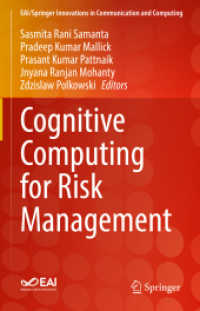Full Description
The APA Handbook of Psychopharmacology provides a comprehensive working knowledge of basic pharmacology and psychopharmacology, examines the utility of pharmacotherapy for addressing different dimensions of human suffering, and highlights the broader professional and social issues surrounding this work in a language that is suitable for a broad readership.
This 33-chapter handbook is designed as a library reference that captures the most current research to date on pharmacotherapy strategies for addressing emotional and behavioral conditions, as an informative guide for educators and students to strengthen their understanding of the scientific and professional issues associated with the field of psychopharmacology, and as an invaluable desk reference for both researchers and practicing clinicians.
Chapters cover fundamental principles of pharmacology and psychopharmacology psychopharmacology for the treatment of psychological disorders, substance use disorders, and addiction and issues pertaining to professional training, policy, and industry. Most chapters include a tool kit of resources, providing recommended references that clinicians can use in practice and as educational and teaching tools to stay abreast of the latest developments on the pharmacological treatments for each disorder.
Contents
Editorial Board
About the Editor-in-Chief
Contributors
A Note From the Publisher
Introduction
Part I. Fundamental Principles of Pharmacology and Psychopharmacology
Chapter . A Brief History of Psychopharmacology in the Context of Psychology and Psychiatry
Chapter 2. Basic Information on Psychotropic Drugs, Receptor Systems, and the Brain
Chapter 3. Basic Psychopharmacology
Chapter 4. The Role of Animal Laboratory Research in Psychopharmacology
Chapter 5. The Role of Clinical (Human) Laboratory Research in Psychopharmacology
Chapter . Evidence-Based Pharmacotherapy
Part II. Implementing Psychopharmacology for the Treatment of Psychological Disorders, Substance Use Disorders, and Addiction
Section . Pharmacological Treatment of Psychological Disorders
Chapter 7. Pharmacological Treatment of Depressive Disorders
Chapter 8. Pharmacological Treatment of Bipolar Disorders
Chapter 9. Pharmacological Treatment of Anxiety Disorders
Chapter . Pharmacological Treatment of Schizophrenia and Other Psychotic Disorders
Chapter . Pharmacological Treatment of Obsessive-Compulsive Disorder and Related Disorders
Chapter 2. Pharmacological Treatment of Impulse Control Disorders
Chapter 3. Pharmacological Treatment of Trauma and Stressor-Related Disorders
Chapter 4. Pharmacological Treatment of Sleep amp ndash Wake Disorders
Chapter 5. Pharmacological Treatment of Eating Disorders
Chapter . Pharmacological Treatment of Attention-Deficit/Hyperactivity Disorder
Chapter 7. Pharmacological Treatment of Autism Spectrum Disorder
Chapter 8. Pharmacological Treatment of Neurocognitive Disorders
Chapter 9. Pharmacological Treatment of Pain and Pain-Related Disorders
Chapter 2 . Pharmacological Treatment of Borderline Personality Disorder
Section 2. Pharmacological Treatment of Substance Use Disorders and Addiction
Chapter 2 . General Introduction: Issues and Perspective on Medication Assisted Treatment
Chapter 22. Pharmacological Treatment of Alcohol Use Disorder
Chapter 23. Pharmacological Treatment of Cannabis Use Disorder
Chapter 24. Pharmacological Treatment of Psychostimulant Use Disorders
Chapter 25. Pharmacological Treatment of Opioid Use Disorders
Chapter 2 . Pharmacological Treatment of Sedative and Anxiolytic Use Disorders
Chapter 27. Pharmacological Treatment of Tobacco Use Disorder
Chapter 28. Pharmacological Treatment of Behavioral Addictions
Part III. Psychopharmacology in Context: Issues Pertaining to Professional Training, Policy, and Industry
Chapter 29. Professional Psychology in the Context of Psychopharmacology: Ethical Issues, Education, and Training
Chapter 3 . Psychologists and Integrated Behavioral Health Care Within the Framework of Psychopharmacology
Chapter 3 . The Role of the Pharmaceutical Industry in the Treatment of Mental Health Disorders
Chapter 32. Nonpharmacological Neurotherapeutics: Principles and Methods of Brain Stimulation Therapy
Chapter 33. Future Directions in Theory, Research, Practice, and Policy
Index







